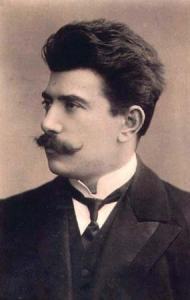Reinhold Moritzevich Glière lived through the worst of the Soviet era and came through unscathed. The main reason for this seems to have been his style of composition, which was relatively conservative but also on occasion nationalistic. (His ballet, the Red Poppy was praised “as the first Soviet ballet on a revolutionary subject”.) Not only was he not attacked as Shostakovich and Prokofiev were, he was awarded honours. Some of these were medals, which clinked like a small percussion section as he walked along. He came to the concerto late in life, being sixty-three when he wrote his first, the Harp Concerto Op 74.
The concerto is in the conventional three movements and lasts around 26 minutes. It is a very enjoyable work. My favourite recorded performance is by Les Concertos Vagabonds with Agnes Clément as soloist. (The talented Ms Clément is also a fine bassoonist.) Les Concertos Vagabonds perform the work with a reduced orchestra, which entails some reallocation of parts. The horn player is outstanding, which is just as well since he features a great deal in this version. Although performed with reduced forces in what comes close to a chamber arrangement, this performance does not come across as a chamber work thanks to the slightly reverberant acoustic.
Glière was capable of very heavy orchestration. For example, in his narrative Third Symphony he uses a large orchestra with quadruple woodwind to illustrate extracts from the life of the legendary hero, Ilya Muromets. An orchestra like this would have drowned out the harp, and though the orchestra for this concerto gives us solid orchestral tuttis, there are many stretches where the scoring approaches chamber quality, allowing the harp to make its mark. So performing it as Les Concertos Vagabonds do works very well.
The composer could not play the harp and sought the advice of the famous Russian harpist, Ksenia Alexandrovna Erdely (1878-1971). She made so many suggestions that he offered to credit her as co-composer, but she take did not take up the offer and the concerto was published as the work of Glière as edited by Erdely. This is only guess on my part, but it was probably knowing Erdely which led him to write this work in the first place – a piece of good fortune for harpists, because few composers have written a concerto for this instrument and this one is very good.
Glière was of German/Polish background but grew up in the Ukraine. He was married with five children. Sometimes when composing he would retreat to the garden, where he was to be seen even when it was raining – sheltering with his manuscript paper under a large table with his feet sticking out. (Unfortunately, I can’t remember where I read this.)
As for Erdely, she lived a long and productive life and we know a lot about it thanks to her book, The Harp in my Life. As far as I know this book is only available in Russian, but a compressed account of her life may be found in Nineteenth- and Twentieth-century Harpists: A Bio-critical Sourcebook by Wenonah Milton Govea.
So, when did any of us last have a chance to hear this lovely concerto live in the concert hall? None of us? Well, there’s a surprise.


Pingback: Musical Notes | Fragmented Mind
fantastic, I listened all through. I would never have come across this composer without your blog. Keep it going, please. (still no email follow button, it’s in the widgets.)
I’m glad you liked it. I love it and listen to it quite often. I’ll keep the blog going a while, though if relatively few people respond I’ll have to consider how viable it is. BTW I see the follow option in the sidebar. Is it not visible to you? If not, I’ll have to figure out why.
What a beautiful concerto. Agnes Clement has a lovely playing style – her movements are so fluid and graceful! I’d love to play it one day but it looks so hard …!!!
I hope you succeed, Eliza, and that I might hear you play it.